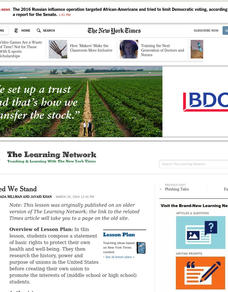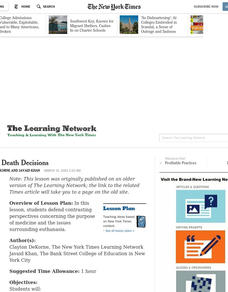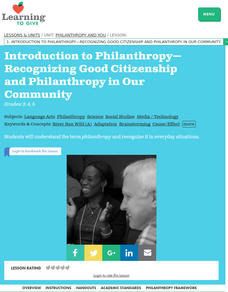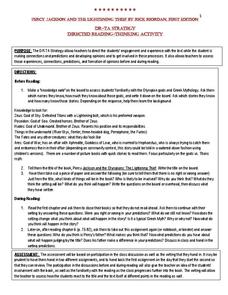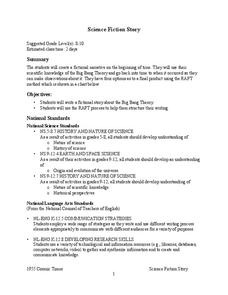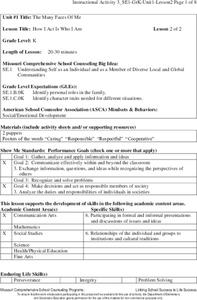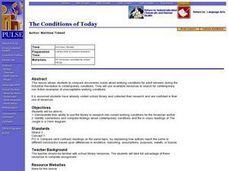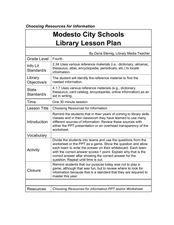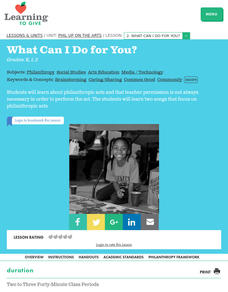Nemours KidsHealth
Fire Safety: Grades 3-5
Three lessons stress the importance of fire safety. Lesson one presents several articles listing fire safety do's and don'ts; using their newly-found knowledge, learners rewrite a newspaper article about a fire incident so that...
Curated OER
Teams in the Field
Students conduct team interviews outside the classroom, either within the school or beyond, as part of a fieldwork project. They use reasoning skills as they formulate questions, plan, predict, hypothesize, and speculate about the...
Curated OER
The Three Major Monotheistic Religions
This activity gives students an opportunity to learn about the three major monotheistic religions in a fun and challenging way, while also allowing them to hone their library research skills. Students research one of the three religions....
Curated OER
Unionized We Stand
Students compose a statement of basic rights to protect their own health and well-being. They research the history, power and purpose of unions in the United States before creating their own union to promote the interests of students.
Curated OER
Life and Death Decisions
Students defend contrasting perspectives concerning the purpose of medicine and the issues surrounding euthanasia.
Curated OER
Substance Use, or Abuse?
Students identify the medicinal benefits, and ill effects, of a variety of controlled substances. They determine whether or not they think hallucinogens should be researched for possible medicinal purposes.
Curated OER
Government Gripes
Students, in groups, investigate the purpose and jurisdiction of government agencies assigned to regulate different science/technology/health issues, then describe situations in which agencies might have a disagreement, and stage a mock...
Curated OER
Introduction to Philanthropy-Recognizing Good Citizenship and Philanthropy in Our Community
Students explore the term philanthropy and recognize it in everyday situations. They list three philanthropic activities occurring in their own home, in their classroom, or in their school. Students identify at least one act they might...
Curated OER
Trade and Travel Along the Silk Road
Students examine the religions that developed along the Silk Road. In this compare and contrast lesson, students visit various stations within the classroom to learn about the Silk Road and the two religions that developed. Using a...
Curated OER
Making the Connection With Quilts
Fourth graders engage in a lesson which integrates the study of the Underground Railroad in Indiana with a Language Arts unit on quilts. They write a book report on one of the quilt books read in class and design a quilt block for the...
Curated OER
Learning a New Environment
Students review a school map with color-coded markers and use it to locate classrooms, bathrooms, library, principal's office, etc. They color a school map, cut it into puzzle pieces and then reassemble the pieces.
Curated OER
The Adventures of Huckleberry Finn: Problematic Situation
Individuals read a series of passages from The Adventures of Huckleberry Finn, rank the statements from the least to the most racist or stereotypical, and share their rankings and rationales in small groups before a whole class...
Curated OER
The Lightning Thief: Directed Reading-Thinking Activity
Before diving into the engaging tale of Percy Jackson and the Lightning Thief by Rick Riordan, conduct this directed reading and thinking activity. Assess your pupils' knowledge of Greek gods and mythology through a knowledge web,...
NASA
Science Fiction Story
A instructional activity allows you to go back in time and see the big bang actually happen. Bazinga! In reality, pupils research the Big Bang Theory and theorize what it would be like to go back in time and see it happen....
Missouri Department of Elementary
How I Act Is Who I Am
A lesson centers itself around the topic of family roles. A whole-class discussion uses puppets and posters to go in-depth into the following character traits; caring, responsibility, respect, and cooperation. The discussion closes with...
Curated OER
Our Classroom-The Community of Fun
Young scholars identify why trust is important to a community. They explain what is meant by a common resource. They compare and contrast how the community functions when rules are followed or not followed.
Curated OER
Genetic Pamphlet with a Purpose
Students design a human genetic condition pamphlet which they present to the class and then take to a doctor's or pediatrician's office.
Curated OER
Squaring Off
Students define examples of patterns and explore the makeup and purpose of patterns found in nature. They create models illustrating the patterns researched in class and relaying the purpose of patterns in various natural objects.
Curated OER
The Conditions of Today
Students demonstrate their ability to use the library to research into current working conditions for the American worker. They identify connections and compare findings about contemporary conditions and the in-class readings of The...
Curated OER
Which reference book helps most?
Fourth graders utilize various reference materials to find specific types of information. In this library research lesson, 4th graders choose the best source of information from the library's reference collection to answer questions.
Curated OER
History of Famous Women
Students discover the famous women who changed society by setting positive examples. In this equality instructional activity, students research a female person who had a positive effect on the world by fighting for her equal...
Curated OER
Phil Up on the Arts
Sstudents examine the concept of community in their classroom and school. They list philanthropic acts they could perform without teacher permission. They also memorize and sing two songs with philanthropic themes.
Curated OER
Nonprofits Are Necessaary
Students research community nonprofit organizations. They identify their purposes and graph them. The search telephone books, websites, and magazines for information on local organizations. They write in journals how nonprofit groups...
Curated OER
Who? What? When? Where? Why? How? So What?
Seventh graders master the SQ3R method. They begin reading for a purpose and organize thoughts through categorizing them. They write in their notebooks what they think about the lesson and the classroom for the day and write a...



